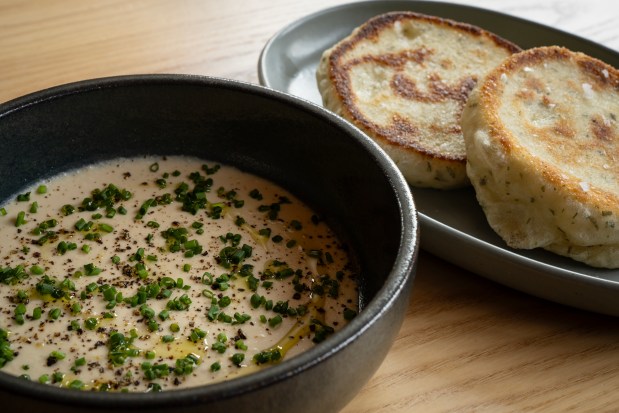Maxwells Trading, the restaurant in Chicago by three-time James Beard-nominated chef and partner Erling Wu-Bower, makes deeply delicious, Asian-influenced, intimately American food that challenges culinary and cultural identity.
The chef opened the restaurant off the Kinzie Industrial Corridor with business partners Josh Tilden and Jess Syburg last December.
“Then I have an executive chef, which is new for me,” Wu-Bower said.
Executive chef Chris Jung was previously at Momotaro and Pacific Standard Time.
“The food is a conversation between Chris and I,” Wu-Bower said. “And he deserves 50% of the credit, if not more.”
That food features a griddle bread inspired by Chinese scallion pancakes and Indian naan, alongside what they call dunks, including a French onion dip by way of the great Midwest.
“We call it city food by city kids,” said Wu-Bower, who was born in Indiana, but was raised in and around Chicago. “I think heritage is both inherited and adopted, and I’m certainly a half Chinese kid, and Chris is certainly a 100% Korean kid.”
They’re also 100% American as children of immigrants who grew up on Italian red sauce and came of culinary age on charcuterie.
But identity can be complicated.
“I despise the term contemporary American,” Wu-Bower said. “I would call it intimately American food.”
“I like to talk about city terroir,” he added. Terroir is a French term traditionally used in wine to describe the flavor imparted by the environment, especially the earth, or la terre. “Plus we have roots growing over our heads at Maxwells.”
The restaurant sources produce from the rooftop greenhouses overhead by The Roof Crop, founded by creative director Tracy Boychuk.
The golden griddle bread and silken dunks transform some of that produce.
“One of my missions was to do a cooked-to-order bread,” Wu-Bower said. Mission accomplished beautifully with the crisp and fluffy puffs flecked with fragrant scallions.
The French onion dip, one of four so-called dunks, conjures what the chef calls “one of the greatest moments in Midwestern dining.”
“You walk into a holiday party,” he said. “And on the island there’s like six different dips.”
At Maxwells, they take onions, “tons and tons and tons and tons of onions,” cook them low and slow with butter, cream cheese, crème fraîche, soy sauce and sherry vinegar, add spinach with truffle oil, then finish with a shower of green chives and black pepper.
It is an intimately and intensely American experience.
The clay pot rice, however, is decidedly Asian. Their take on the southern Chinese dish tops pearlescent Japanese Yamagata koshihikari rice with tender Shanghai-style braised pork belly, Cantonese lap cheong sausage, meaty shiitake mushrooms, yuba tofu skin and broad fava beans.
“This is the most highly researched and developed dish on the menu,” Wu-Bower said. “I call it mama’s home cooking.”
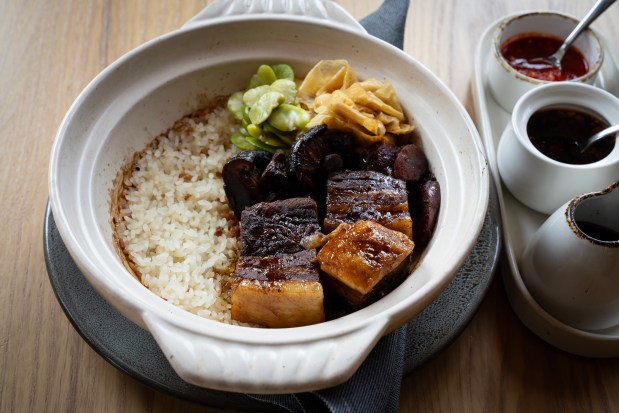
His mother is not just a great home cook. Liv Wu was the executive chef at Google and was a restaurant critic under the byline Olivia Wu.
“That’s my mom’s five-spice braised pork belly,” Wu-Bower said. But he credits the push for clay pot rice over fried rice to executive chef Jung.
While the toppings may be impressive, I and other connoisseurs of the dish judge it by the scorched rice bottom.
“When a cook starts on the station, I’m like, until you burn one of these, you actually haven’t pushed it far enough,” Wu-Bower said.
They cook the prized rice in a Japanese-inspired stock.
“I think the soulfulness actually comes from the stock, which we actually intentionally under season,” he added. So you’ll use the house-made chile crisp and sambal, along with the single barrel finishing soy sauce his mother imports from Taiwan.
My mother, 90-year-old Mom Chu, who’s famous among friends and family for her red braised beef, gave approving head nod props to Mama Wu, as did I, but the restaurant cooks could have pushed that coveted scorched rice crust a bit more for my taste.
The martini program was foundational at the organic modern space, where a concrete and wood detailed bar leads through the dining room to an open kitchen with live-fire cooking.
“We kind of laugh about this,” Wu-Bower said. “The business plan was to build a restaurant and a bar where Josh and I could listen to our own records and drink our own martinis.”
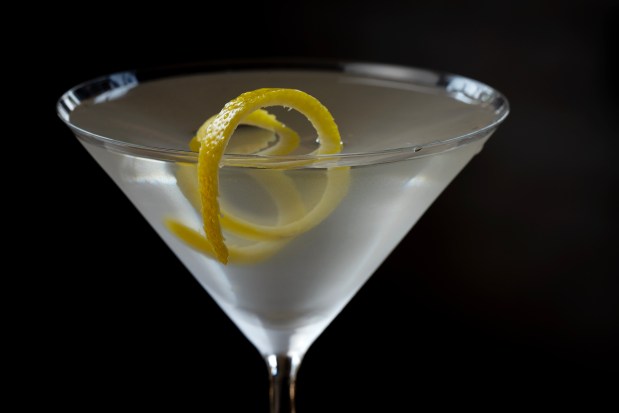
They had opened Pacific Standard Time restaurant with One Off Hospitality, but the restaurant group has since made that space a second location of Avec.
Full disclosure, I first met Wu-Bower when I staged at the original Avec many years ago. On one of my two visits to Maxwells Trading, he reminded me that the last time we saw each other may have been at One Off chef and partner Paul Kahan’s house while shooting the Chicago episode of “Anthony Bourdain: No Reservations” 15 years ago.
He was definitely the kid chef in that episode. Now he has his own city kid restaurant.
And the Vesper martini is his drink of choice.
Their signature smooth and strong variation on the famous James Bond cocktail shakes Jin Jiji India dry gin with Ketel One vodka and Cocchi Americano aperitif wine, garnished with a precise lemon twist.
“It’s not a shy cocktail,” Wu-Bower said. “And it’s a great way to amplify joy.”
Beverage director Kristina Magro was previously at The California Clipper, but Wu-Bower put the wine list together, “and it’s a really cool, esoteric and classic list,” he said.
And they do listen to records, on vinyl.
“Whole albums only,” Wu-Bower said. “We start the week with jazz, we move into soul and kind of end with funk.”
It gets loud when crowded inside. Outside, the sidewalk patio remains relatively quiet except for the occasional clatter of trains down the street.
The lovely crème brûlée-esque Japanese sweet potato is a cousin to the roasted Asian street food, but it’s steamed soft for hours then amped with a crackling top and a complex Massaman Thai green curry with basil from the roof.
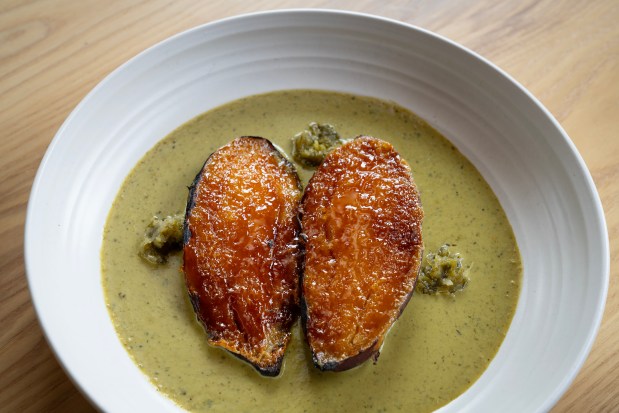
A brilliant half chicken a la brasa, grilled over that live fire, gets served with rooftop lima beans and collard greens plus a stunning ginger scallion salsa verde.
The spectacular 18-ounce bone-in strip steak, cooked perfectly to order and sliced on a platter, may be overshadowed by a bountiful bowl of luminous lettuce and shiso leaves from above, alongside a trio of seasonal house-made sauces.
Those accompaniments reflect Wu-Bower’s father’s American Southern side of the family.
“My dad was born to a Baptist minister in New Orleans,” the chef said. “That’s why there’s collard greens and lima beans.”
Calvin Bower grew up in true Cajun country, in the Lafayette area, Wu-Bower said. He may have inherited his music appreciation from his father who is a professor emeritus of musicology at the University of Notre Dame.
“When my relatives come in, it just makes me nervous,” Wu-Bower said. “Because I know that the food and the traditions are being carefully dissected.”
He’s confident about his staff though. Service on both my visits was excellent, executed with casual expertise.
Maxwells Trading is a no-tipping restaurant with a 20% gratuity service charge, but you can leave an additional tip.
The suzuki tartare has become a staff and fan favorite with Japanese sea bass, a chile and soybean paste plus tiny nasturtium lily pads. While I appreciate its popularity and commend the choice of a sustainable fish, the flavors seemed rather muted on my plate.
A spirit-free fruit and herbal elixir, on the other hand, with rooftop ancho chile honey and mango soda, was overwhelmingly syrupy.
The Royal Milk tiramisu with black tea mousse and praline chocolate seemed so promising with its nod to the beloved canned drink, but the pastry begged for a much longer soak.
A forbidden rice pudding, foreboding with its jiggly mango gel topping, could have used just the tropical fruit, especially since we may have the mango capital of the world in Romeoville.
That Basque butter cake though, exquisitely rich on its own, crowned recently with a blueberry compote and plated on a prosecco sabayon cloud, stands as the perfect dessert of choice, and will change seasonally.
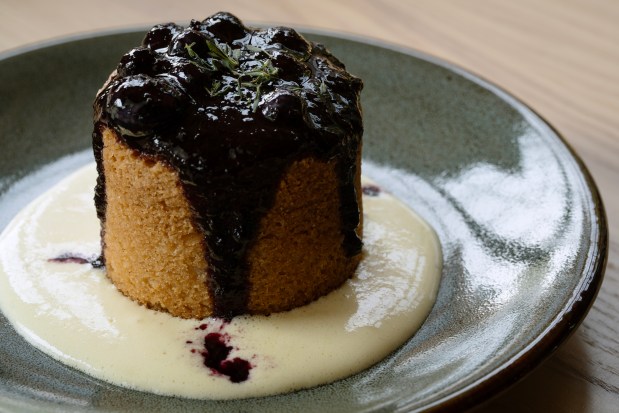
Pastry chef Amanda Rockman, previously at Nico Osteria, where Wu-Bower earned his Beard nominations, consults on desserts. They’re made by the restaurant cooks, and as skilled as they are, dessert could use the same level of intellectual conversation evident across the rest of the menu.
Even the TRC immunity boost herbal tea holds a secret origin story, and the thoughtful tisane may have been my surprise song of the summer. It’s made with ever-changing herbs and flowers from The Roof Crop, and served with a delicately sweet syrup, made with honey from the same blossoms.
We talk about terroir. This is what I’m calling airroir, from the heavens above.
By the way, Maxwells Trading is named after another city kid, the oldest son of Wu-Bower and his wife, Kimberly Galban, but there’s no apostrophe. I wondered, was it a Chicagoism, like how we say Jewels instead of Jewel, as in the Jewel-Osco grocery store?
“Honestly, I wish there was a better story,” Wu-Bower said. “It’s just a graphic consideration, that’s all.”
Maxwells Trading
1516 W. Carroll Ave.
312-896-4410
Open: Tuesday to Thursday 4:30 to 9 p.m., Friday and Saturday to 10 p.m., closed Sunday and Monday
Prices: $17 (griddle bread with French onion dip dunk), $22 (Japanese sweet potato), $40 (claypot rice), $19 (Basque butter cake), $16 (Vesper martini), $6 (TRC Immunity Boost tisane)
Noise: OK to loud inside (68 to 82 dB)
Accessibility: Wheelchair accessible through Justine Street entrance with restrooms on single level
Tribune rating: Excellent, 3 of 4 stars
Ratings key: Four stars, outstanding; three stars, excellent; two stars, very good; one star, good; no stars, unsatisfactory. Meals are paid for by the Tribune.
Big screen or home stream, takeout or dine-in, Tribune writers are here to steer you toward your next great experience. Sign up for your free weekly Eat. Watch. Do. newsletter here.


